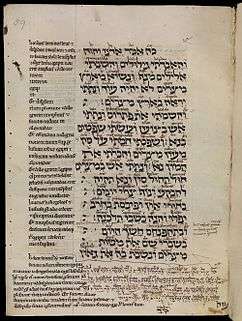Ezekiel 22
| Ezekiel 22 | |
|---|---|
 Book of Ezekiel 30:13–18 in an English manuscript from early 13th century, MS. Bodl. Or. 62, fol. 59a. A Latin translation appears in the margins with further interlineations above the Hebrew. | |
| Book | Book of Ezekiel |
| Bible part | Old Testament |
| Order in the Bible part | 26 |
| Category | Nevi'im |
Ezekiel 22 is the twenty-second chapter of the Book of Ezekiel in the Hebrew Bible or the Old Testament of the Christian Bible. This book contains the prophecies of the prophet Ezekiel, and is one of the Books of the Prophets. This chapter contains three separate prophecies centering on the inevitable punishment due to the guilt of Jerusalem.[1]
Text
The original text is written in Hebrew. Since the division of the Bible chapters and verses, this chapter contains 32 verses.
The chapter contains a denunciation of the various sins of Jerusalem coupled with a promise of judgment (verses 1-16). The prophet compares Jerusalem to metal filled with impurities, and promises that God will purge the impurities by burning (17-22). Ezekiel justifies the judgment against Jerusalem in terms of wrongful acts committed by various leaders, including prophets, priests, and the nobility (23-31).
Textual versions
For the Masoretic Text, one of the sources for reconstructing the oldest form of this book, some of the oldest manuscripts are the Codex Cairensis, the Aleppo Codex (10th century), and the Leningrad Codex (1008-1009). Ancient versions into Koine Greek, made by translation, include the Septuagint and Theodotion's version (from c. 180 AD).
Verse 18
- Son of man, the house of Israel has become dross to Me;
- "Son of man" (Hebrew: בן־אדם ḇen-’āḏām): this phrase is used 93 times to address Ezekiel.[3]
- "Dross" (Hebrew: סיג or סוג, sig or sug, plural: סגים): "what is removed from metal", usually of silver;[4] "the refuse of metal", "scoria", baser metal that is separated from the purer metal by melting.[5] As silver is purified in the furnace to remove the floating dross until the reflection of the image of the refiner is shown from its molten surface, the judgment of Israel was for the purpose of purification.[6]
See also
Notes and references
- ↑ Clements 1996, p. 100.
- ↑ Ezekiel 22:18
- ↑ Bromiley 1995, p. 574.
- ↑ Brown, 1994 & "סִיג".
- ↑ Gesenius, 1979 & "סִיג".
- ↑ The New Oxford Annotated Bible with the Apocrypha, Augmented Third Edition, New Revised Standard Version, Indexed. Michael D. Coogan, Marc Brettler, Carol A. Newsom, Editors. Publisher: Oxford University Press, USA; 2007. pp. 1209-1211 Hebrew Bible. ISBN 978-0195288810
Bibliography
- Bromiley, Geoffrey W. (1995). International Standard Bible Encyclopedia: vol. iv, Q-Z. Eerdmans.
- Brown, Francis; Briggs, Charles A.; Driver, S. R. (1994) [1906]. The Brown-Driver-Briggs Hebrew and English Lexicon (reprint ed.). Hendrickson Publishers. ISBN 978-1565632066.
- Clements, Ronald E (1996). Ezekiel. Westminster John Knox Press. ISBN 9780664252724.
- Gesenius, H. W. F. (1979) [1857]. Gesenius' Hebrew and Chaldee Lexicon to the Old Testament Scriptures: Numerically Coded to Strong's Exhaustive Concordance, with an English Index. Translated by Tregelles, Samuel Prideaux (7th ed.). Baker Book House.
- Joyce, Paul M. (2009). Ezekiel: A Commentary. Continuum. ISBN 9780567483614.